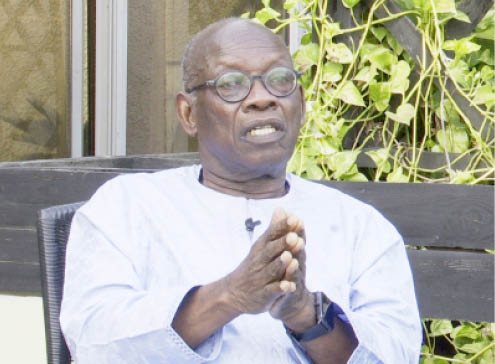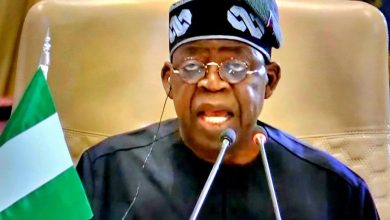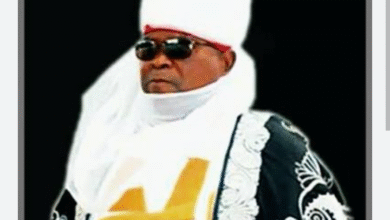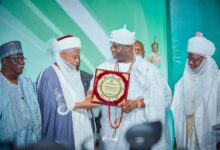Adele Jinadu warns ruling class against repeating causes of 1965, 1983 Nigerian democracy collapses

By BASHIR ADEFAKA
The hurry and speed with which the National Assembly has been performing its oversight role over the executive during its current session leaves room for great concern, even alarm.
Former President of the International Political Science Association (IPSA), Professor Ilyas Adele Jinadu, has expressed his concerns about the possible catastrophe Nigeria will be plunged into should the current political class in the country continue their current way, warning them against repeating the same causes leading to derailment of democracy during the 1965 and 1983 elections.

Stating some of the causes as insistence of ruling parties on winning the federal elections despite their unpopularity and clear indications that they would not win in free, fair and credible elections, the Professor said the ruling class since the return of democracy have failed to formulate public policies that prioritise the welfare of Nigerians, particularly the weakest and most vulnerable in our country.
These behaviours, he said, run counter to the struggle for democratic rule by the various pro-democracy groups that ushered in the Fourth Republic in 1999.
He added that, “They are against the basic rule of democratic elections, which is that ruling parties must not misuse or abuse the power and resources of the state, including state institutions, for their parties’ partisan electoral advantage.”
Professor Adele Jinadu stated this while sharing his thoughts in an interview with the PUNCH Newspaper as published on Sunday May 11, 2025 on the gale of defections of opposition figures to the ruling All Progressives Congress (APC) among other matters.
He described what is happening currently to mean that Nigeria is one step away from authoritarian state, detailing the concerns leading to alarm raised by some 18 stakeholders who said that Nigeria was heading towards a one-party system.
The professor of political science said, “Following from this, our concern is also that the consequences of these developments will likely not create the fair and free electoral playing ground necessary to protect and ensure the popular electoral mandate they are expected to confer on winning parties.
“In short, the developments reflect a common trend in our country’s electoral history, which led to the derailment of democratic politics during the First Republic in January 1966 and the Second Republic in December 1983, when competition rules were disregarded by generally unpopular ruling parties bent on winning the 1964/1965 and 1983 federal elections despite clear indications that they would not win in free and fair elections.
“Finally, we are concerned about the apparent apathy of the generality of Nigerians towards what these developments pose to the future of democracy, human development, and security in the country. These developments are indeed nurtured and fed by this apathy among Nigerians.”
On what he believes is responsible for the ongoing gale of defections to ruling APC, he blamed the situation on the abuse of the power of incumbency by ruling class.
“The sources of responsibility for the gale of defections are complex, but they involve the following interconnected dimensions of our electoral politics and our party and electoral system.
“One, the abuse or misuse of the power of incumbency by ruling parties, especially at the federal level, for their parties’ partisan electoral advantage, used to blackmail, harass, or intimidate their political opponents in other parties.
“Two, an amoral political culture that encourages impunity in public political life, especially as manifested in the approach to politics by politicians who see it as an avenue for corrupt personal enrichment, and the criminal deployment of the public procurement process by ruling parties at federal and state levels to accumulate a war chest and arsenal for winning elections.
“Three, a weak party system that is not built on shared party principles or political ideology; one under which political parties lack internal democracy and reflect anti-democratic practices in their selection of party officials and nomination processes for electing party candidates for public office in the federal and state executive and legislature.
“Four, an electoral legal framework that encourages defections through deliberate ambiguities in the electoral law regarding the conditions and consequences of defection and the recall of defectors who cross from the parties under which they were elected.
“Five, the lack of a sense of public outrage against defections, which encourages defectors to feel emboldened because they are confident they can get away with it,” said the political scientist.
Speaking more emphatically, he found it difficult to see how the defections, generally believed as ostensible orchestration of the ruling party, will be enough to guarantee victory for President Bola Ahmed Tinubu in 2027.
“I do not know. We should wait and see how the configuration of events and omens in our political and socio-economic firmament unfolds to affect the 2027 general elections,” he said, as he also warned the opposition to be alert to their responsibility of providing checks to ruling party for national development.
“Once defections start and the ruling party sets out to decapitate the opposition, the development can, in turn, set off a chain of reactions that may engulf not only the political class but also the country as a whole in a deluge of political crises that does nobody any good. It is for the rest of us, the citizens, to rescue the country from the politicians, and the politicians from themselves.
“This is the lesson of our electoral history and the point made by Machiavelli and other political theorists in emphasising the republican virtue of placing the public interest above self-interest when the public interest is under attack by those who pursue politics as a self-interested vocation,” he warned.
On whether a coalition or opposition will be able to defeat the APC in 2027, Professor Adele Jinadu said, “It is too early to say in the absence of a survey to determine this. As I said earlier, it all depends on future developments and events in the year before or in the terminal months leading up to the elections.”
Knocks NASS
He commented on criticism of the National Assembly for being too submissive to the executive, said, “In democratic theory, the legislature in parliamentary, but more so in presidential systems, is expected to subject the executive branch and the judiciary to oversight, just as the other two branches have some oversight role over the legislature. The hurry and speed with which the National Assembly has been performing its oversight role over the executive during its current session leaves room for great concern, even alarm.
“For example, there has been little oversight over nominations for ministers and for other public political appointments requiring confirmation by the Senate, even when the public has voiced credible objections to some of the nominees. Budgets have been passed by the current Assembly without much debate or their details being carefully scrutinised.
“The theory of separation of powers, mediated by the theory of checks and balances, is at the heart of democratic politics, and if the practice by the current National Assembly of not subjecting the executive branch to legislative oversight as the country’s Constitution stipulates continues, we are one step away from a single-party dominant authoritarian state, with the arrogance of power, impunity, and reckless abuse of power that it breeds, even in mature democracies.
“This is why there is a need to strengthen the constitutional guardrails meant to act as sentinels in defence of democracy. Where this is not the case, where the guardrails are consistently trampled upon with arrogant impunity, the last guardrail remaining lies with the citizens, who must exhibit the republican virtue anchored on the demand for public interest policy. This is the message of the saying, “Eternal vigilance is the price of liberty.””
LG autonomy
On local government autonomy not yet taking effect eight months after the Supreme Court verdict, Professor Adele Jinadu gave result of his assessment of the reasons.
“Local government autonomy will continue to be a problem so long as our political leaders cannot reach an elite consensus to extend the same limited autonomy or home rule that has been extended to state governments by granting local governments some limited autonomy from state governments.
“The theory of limited autonomy defining state–federal constitutional relations should, in other words, guide state local government relations. This is the general trend in many federations today,” he said.









